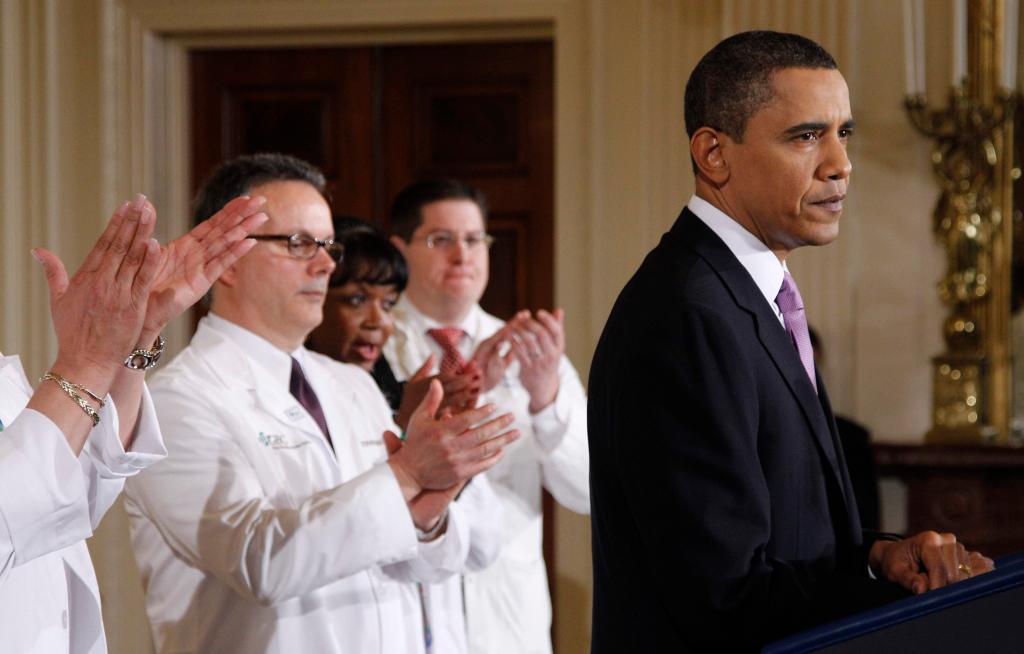WASHINGTON — Making an impassioned demand for swift action on health care, President Obama called Wednesday for Congress to vote on sweeping legislation “in the next few weeks,” even if that requires Democrats to move forward without Republican support.
“I believe the United States Congress owes the American people a final vote on health care reform,” Obama said from the East Room of the White House. “We have debated this issue thoroughly, not just for a year, but for decades. Reform has already passed the House with a majority. It has already passed the Senate with a supermajority of 60 votes. Now is the time to make a decision.”
It was the strongest, most specific language the president has used to drive his health care ideas forward. And he set a clear timeline for wrapping up the prolonged drama.
After the speech, the White House indicated that Obama would take to the road next week to campaign for the legislation with stops in Philadelphia and St. Louis.
And on Capitol Hill, party leaders were making the final push to line up the necessary votes behind a two-part strategy that will rely on a parliamentary maneuver known as budget reconciliation to circumvent Republican opposition.
Under that strategy, House Democrats would approve and send to the president the health bill passed by the Senate last year. Both the House and Senate would then approve a second bill containing changes to the terms of the Senate bill, using budget reconciliation.
Under Senate rules, bills considered under that process can pass with a simple 51-vote majority, rather than the 60-vote supermajority needed to prevent filibusters that stall legislation.
Obama made clear Wednesday that he would back reconciliation to advance health care, citing its use by past Republican Congresses to overhaul welfare in the mid-1990s and to pass two large tax cuts in the first years of the last Bush administration.
Health care “deserves the same kind of up-or-down vote,” Obama said.
Republican leaders were already stepping up their accusations that Democrats are arrogantly ignoring the public, a charge repeated Wednesday by Senate Minority Leader Mitch McConnell, R-Ky.
“They think they are smarter than the American people,” he said. “They think, ‘We’re going to give this to you, whether you want it or not.’” McConnell predicted that if Democrats enact their overhaul, “there is an overwhelming likelihood that every Republican candidate will be campaigning to repeal it.”
In the Senate, Democrats will face yet another challenge from Republicans if they try to bring the reconciliation package to the floor. The Senate’s budget rules will limit debate on the measure to 20 hours, but there is no limit on the number of amendments that Republicans may offer, raising the spectacle of what is known as a “vote-a-rama” that could drag on for days.
A senior Republican adviser conceded that senators may not have the stamina to keep it up, but they may still cause trouble by forcing roll calls on politically sensitive amendments.
In his speech, Obama made one more nod to his opponents, highlighting GOP ideas that Democrats have incorporated into their health legislation. And he repeated an offer he made Tuesday to incorporate additional Republican proposals, including initiatives to root out Medicare fraud, reduce medical malpractice lawsuits and encourage greater use of individual health savings accounts.
“(My plan) incorporates the best ideas from Democrats and Republicans — including some of the ideas that Republicans offered during the health care summit,” Obama said. But he made clear he would settle for nothing less than legislation that would expand coverage and tighten regulation of the insurance industry.
Obama rejected GOP calls to start anew. “The insurance companies aren’t starting over. They are continuing to raise premiums and deny coverage as we speak,” he said. “For us to start over now could simply lead to delay that could last for another decade or even more.”
And Obama explicitly invited Republicans to reject the legislation if they disagreed with Democratic moves to strengthen government.
“If they truly believe that less regulation would lead to higher-quality, more affordable health insurance, then they should vote against the proposal,” he said.
Send questions/comments to the editors.



Success. Please wait for the page to reload. If the page does not reload within 5 seconds, please refresh the page.
Enter your email and password to access comments.
Hi, to comment on stories you must . This profile is in addition to your subscription and website login.
Already have a commenting profile? .
Invalid username/password.
Please check your email to confirm and complete your registration.
Only subscribers are eligible to post comments. Please subscribe or login first for digital access. Here’s why.
Use the form below to reset your password. When you've submitted your account email, we will send an email with a reset code.